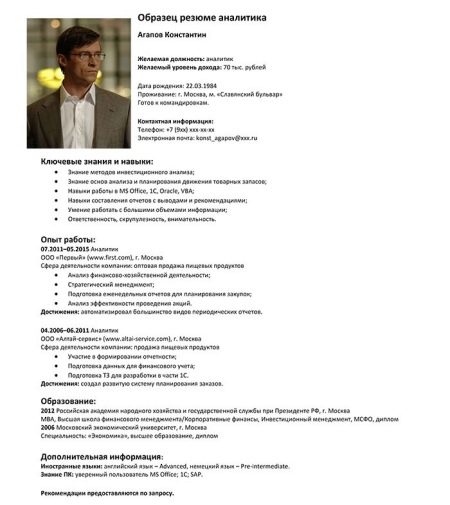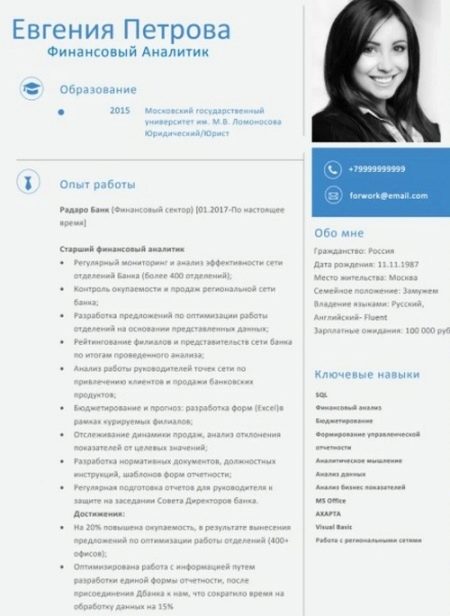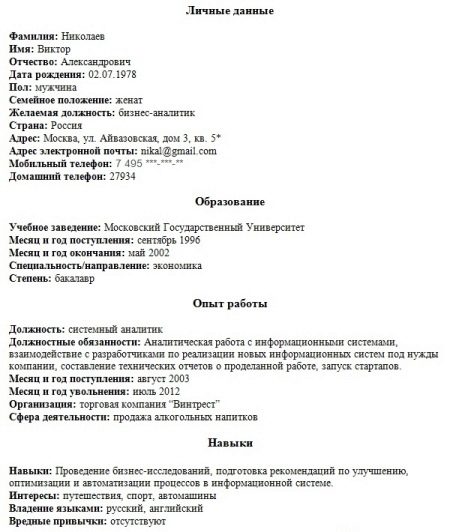Today, one of the most complex and complex professions is the profession of analytics. Specialists of this profile can engage in a variety of activities. So, there are business analysts, system analysts, technology analysts and other highly specialized specialists.
However, regardless of the specific field of activity, each analyst, getting a job, must provide the employer with a professional resume. This document should be prepared taking into account all modern requirements and rules.
What key points should be included in the resume of the analyst? How to write a cover letter? Today in our article we will help you find answers to your questions.

Key Points
The first thing to think about in the process of writing a resume is to draw up its clear structure. Remember that a document that is necessary for employment should be easy to read and read. In this regard, it is recommended to divide your resume into several key points.
Education
It is believed that a professional, high-class and highly qualified analyst cannot be without higher education.
That is why the vast majority of employers will pay particular attention to whether you have a diploma.
In addition, due to the fact that the profession of analyst is quite in demand and is characterized by high competitiveness, the level of the university in which you studied was also important - prestigious metropolitan universities are considered an advantage.
However, if you graduated from a small provincial institute, then you should not be upset, as the presence in the resume of certificates of completing additional courses and trainings can positively affect a potential employer.

Professional skills
This item is the most important summary block of any analytics. It is thanks to the information that you provide in this column that the employer will judge you as a specialist. Depending on the specific specialization, as well as on the place of work, the necessary competencies may vary, however, more or less standard analyst skills include:
- understanding of business processes in detail;
- theoretical knowledge and ability to put into practice such systems and principles as EPC, BPMN, UML;
- business analysis skills;
- Ability to work with As Is and To Be processes;
- the ability to develop diverse technical specifications;
- the ability to use a personal computer at the advanced user level;
- knowledge of specialized computer programs and applications;
- knowledge of processes such as ITSM and ITIL;
- ability to integrate applications and more.
Before filling out this column, carefully read the job description again and indicate the competencies that will be most relevant for a particular place of work.

experience
In order to get a high-ranking or leading position (for example, the position of the head of the analytical department in an international company), you will definitely need experience. Moreover, its duration will depend entirely on the wishes of the employer. In this regard, in the resume in chronological order it is important to register all those companies where you previously worked as an analyst.
It is recommended that you do not specify more than 3-5 previous jobs. In addition, it is advisable to dwell only on the most famous and reputable companies. And also experts advise not to write in the resume those companies where you have worked for less than 1 year.
The thing is that short-term work can negatively affect your perception of the employer. And it is also possible that at the interview a question may arise about why you left this or that position so quickly.
Although the points described above are key to any analyst’s resume, the document for employment should contain other information: contact information, your personal qualities, hobbies and hobbies, as well as any other information relevant to the position.

How to write?
For employment as a data analyst, business processes, as well as as a system or financial specialist, it is very important to provide an employer with a well-written resume.
There are certain rules for writing a document.
- So, The length of a business resume intended for employment should not exceed 1 page. Remember that the employer receives a large number of responses, and he simply physically will not have enough time to read voluminous materials. To ensure that your resume does not go beyond the permitted volumes, you will have to make sure that you did not include in the document any extra information (for example, biographical details or unnecessary stories about personal life).
- In order for your document to be easily read and perceived by the employer, it must be clearly structured. To do this, divide the resume into separate sections and columns. Moreover, subtitles are desirable to highlight a different font size.
- When writing a document, it is allowed to use formal business style only. Thus, you will make it clear to the employer that you have the necessary knowledge of business etiquette, and also know how to communicate with representatives of the corporate world. Any colloquial and artistic phrases are unacceptable.

Covering letter
A cover letter is an optional document when applying for a job.Rather, it plays a supporting role, giving you the opportunity to more fully reveal your abilities and skills to the employer.
In the cover letter, it is recommended to tell in more detail about your educational and professional experience, as well as highlight your advantages to the employer that will set you apart from all other job seekers.
Samples
In order for you to be able to compile your resume correctly, we suggest you familiarize yourself with successful examples of documents for employment.
- This summary is rather concise. It does not contain unnecessary personal information, but at the same time, the applicant took into account all the details and provided possible questions. For example, one can note the fact that he had previously announced his readiness for business trips.

- This example of a financial analyst’s resume is distinguished by its stylish design, which immediately makes it clear to the employer that the candidate for the position is not afraid to show his creative abilities and creativity even in the professional sphere.

- A distinctive feature of this resume is the lack of photography. In some cases, this approach is appropriate. Carefully read the job description in order to understand if the employer has any special requirements or wishes regarding the preparation of a resume.











